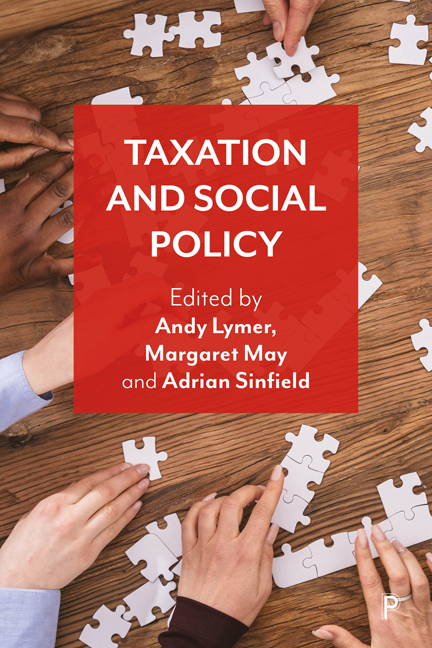Book contents
- Frontmatter
- Contents
- List of figures and tables
- List of abbreviations
- Notes on contributors
- Acknowledgements
- 1 Introduction: The case for considering taxation and social policy togethe
- 2 Fiscal and social policy: two sides of the same coin
- 3 Tax and the social policy landscape
- 4 Fiscal welfare and tax expenditures
- 5 Employment, self-employment and taxation
- 6 Pensions and taxation
- 7 Tax, benefits and household income
- 8 Taxation, health and social care
- 9 Homes, housing and taxation
- 10 Wealth taxation: the case for reform
- 11 Gender and taxation
- 12 Taxation and local taxes
- 13 Corporate tax and corporate welfare
- 14 The climate crisis and taxation
- 15 Conclusions: Taxation in a social policy context
- Index
2 - Fiscal and social policy: two sides of the same coin
Published online by Cambridge University Press: 20 January 2024
- Frontmatter
- Contents
- List of figures and tables
- List of abbreviations
- Notes on contributors
- Acknowledgements
- 1 Introduction: The case for considering taxation and social policy togethe
- 2 Fiscal and social policy: two sides of the same coin
- 3 Tax and the social policy landscape
- 4 Fiscal welfare and tax expenditures
- 5 Employment, self-employment and taxation
- 6 Pensions and taxation
- 7 Tax, benefits and household income
- 8 Taxation, health and social care
- 9 Homes, housing and taxation
- 10 Wealth taxation: the case for reform
- 11 Gender and taxation
- 12 Taxation and local taxes
- 13 Corporate tax and corporate welfare
- 14 The climate crisis and taxation
- 15 Conclusions: Taxation in a social policy context
- Index
Summary
The persistent lack of co-ordinated policy
There has been no shortage of public and policy debate about both taxation policy and social policy in recent decades. The vacuum has been in bringing these two together. Both economic efficiency and fairness have suffered from this absence of coordinated policy development, reducing the ability of even those governments that wished to do so to challenge rising inequality. Is there a way forward in some of the radical proposals for merging the two systems? Has the COVID-19 pandemic, requiring unprecedented levels of public support for jobs and incomes, changed attitudes in such a way as to make such radical reforms more likely?
By the time of the first volume of Taxation and Social Policy (Sandford et al, 1980), the interaction between taxes and benefits had been the subject of policy debate for some years. The Right had been keen to explore integration of tax and social security through some form of negative income tax or tax credits (as proposed by the Conservative government of 1972), while some on the Left had highlighted the similarity between social security and ‘tax expenditures’ (Sinfield, 1978; also Chapter 4). But there was still considerable scepticism in official circles about the parallels between the two systems.
When two of the first volume's editors (Robert Walker and I) were teaching economics at the Civil Service College (now National School of Government), we brought together officials from the Treasury and Inland Revenue with those from ‘spending departments’, including the (then) Department of Social Security. We wanted to explore with them how the two sides of fiscal policy might be considered together. The discussions, amid the rhododendrons of Sunningdale, were to help us shape our thoughts for the forthcoming volume.
We soon discovered that this was the first time many of these officials had met, let alone worked together, and the suggestion that tax allowances and reliefs might perform similar functions to social security benefits was met with disdain by many of the senior civil servants present. That some of the better-off might be in receipt of state support via such reliefs was considered a somewhat offensive idea.
- Type
- Chapter
- Information
- Taxation and Social Policy , pp. 6 - 22Publisher: Bristol University PressPrint publication year: 2023



